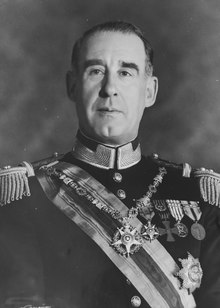Francisco Craveiro Lopes
Francisco Craveiro Lopes | |
|---|---|
 | |
| President of Portugal | |
| In office 9 August 1951 – 9 August 1958 | |
| Prime Minister | António de Oliveira Salazar |
| Preceded by | Óscar Carmona |
| Succeeded by | Américo Tomás |
| Interim Governor-General of the Portuguese India | |
| In office 17 September 1936 – 12 July 1938 | |
| President | Óscar Carmona |
| Preceded by | João Carlos Craveiro Lopes |
| Succeeded by | José Ricardo Pereira Cabral |
| Personal details | |
| Born | Francisco Higino Craveiro Lopes 12 April 1894 Lisbon, Kingdom of Portugal |
| Died | 2 September 1964 (aged 70) Lisbon, Portuguese Republic |
| Political party | National Union |
| Spouse | Berta da Costa Ribeiro Arthur |
| Children | 4 |
| Profession | Air force officer |
| Awards | Order of Christ Order of Aviz Order of the Tower and Sword Order of the Bath Royal Victorian Chain |
| Signature | |
| Military service | |
| Branch/service | Portuguese Air Force |
| Years of service | 1911–1964 |
| Rank | Marshal of the air force |
Francisco Higino Craveiro Lopes (Portuguese pronunciation: [fɾɐ̃ˈsiʃku iˈʒinu kɾɐˈvɐjɾu ˈlɔpɨʃ]), GCTE, ComC, GCA, (12 April 1894 – 2 September 1964) was a Portuguese politician and military man. Decorated with the Order of the Bath and the Royal Victorian Chain, he was the 12th President of the Portuguese Republic between 1951 and 1958.
Early life and career
Born in Lisbon, he was a son of João Carlos Craveiro Lopes, Portuguese army general and 122nd Governor-General of Portuguese India (1929–1936) and his wife Júlia Clotilde Cristiano Salinas.
He concluded his Colégio Militar studies by 1911, having then entered the Escola Politécnica de Lisboa, in the same year he joined a cavalry regiment. He succeeded his father as the 123rd General Governor of Portuguese India (1936–1938).[1]
Presidency
Prime Minister António de Oliveira Salazar chose Craveiro Lopes as the regime's presidential candidate in 1951 to succeed the late Óscar Carmona. Initially, he was to run in what would have been only the second contested election of the Estado Novo, when naval officer Manuel Quintão Meireles filed to run against him. However, Quintão Meireles withdrew before election day, and Craveiro Lopes was elected unopposed.
Under the Constitution, the president was vested with near-dictatorial powers. In practice, Carmona had mostly turned over the government to Salazar. However, Craveiro Lopes was not willing to give Salazar the free hand that Carmona had given him. Despite this, he did go as far as to dismiss Salazar; for all intents and purposes, the president's power to sack the prime minister was the only check on Salazar's power.
Nevertheless, Salazar picked the seemingly more pliant naval minister, Américo Tomás, as the regime's candidate in 1958. The Democratic Opposition then invited Craveiro Lopes to be their candidate, but he knew he stood no chance of winning and refused. The regime, however, as compensation promoted him to Marshal. He was involved in the failed military attempt to overthrow Salazar in 1961, led by the Defence Minister Júlio Botelho Moniz.
He died in Lisbon on 2 September 1964.
Family
He married Berta Ribeiro Artur (Lisbon, Pena, 15 October 1899 – Lisbon, Santa Maria de Belém, 5 July 1958), natural daughter of Engineer Sezinando Ribeiro Artur (Lisbon, 1875 – Lourenço Marques, 1918) by Maria Clara Pereira, by whom he had four children.
References
- ^ AJAX Club Bologna. "Goa 1510-1961".
- Craveiro Lopes. presidencia.pt
- Use dmy dates from October 2012
- 1894 births
- 1964 deaths
- People from Lisbon
- Portuguese military officers
- Presidents of Portugal
- Honorary Knights Grand Cross of the Order of the Bath
- Recipients of the Royal Victorian Chain
- Marshals of the air force
- National Union (Portugal) politicians
- Governors-General of Portuguese India
- Field marshals of Portugal
- 19th-century Portuguese people
- 20th-century Portuguese politicians


